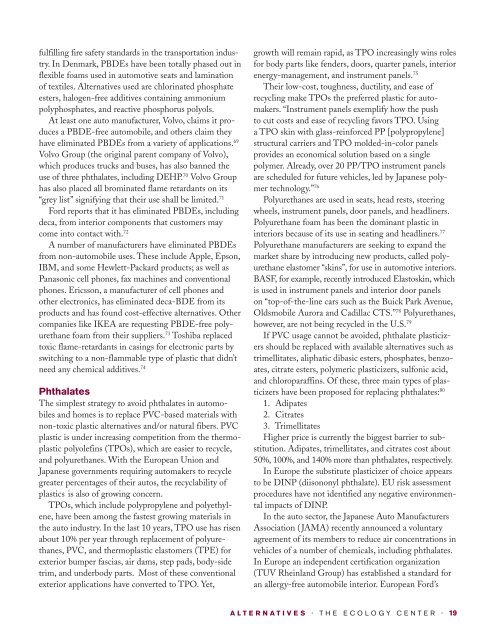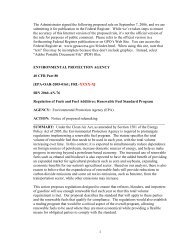Chemicals in cars and the need for safe alternatives
Chemicals in cars and the need for safe alternatives
Chemicals in cars and the need for safe alternatives
Create successful ePaper yourself
Turn your PDF publications into a flip-book with our unique Google optimized e-Paper software.
fulfill<strong>in</strong>g fire <strong>safe</strong>ty st<strong>and</strong>ards <strong>in</strong> <strong>the</strong> transportation <strong>in</strong>dustry.<br />
<strong>in</strong> Denmark, pBDes have been totally phased out <strong>in</strong><br />
flexible foams used <strong>in</strong> automotive seats <strong>and</strong> lam<strong>in</strong>ation<br />
of textiles. Alternatives used are chlor<strong>in</strong>ated phosphate<br />
esters, halogen-free additives conta<strong>in</strong><strong>in</strong>g ammonium<br />
polyphosphates, <strong>and</strong> reactive phosphorus polyols.<br />
At least one auto manufacturer, Volvo, claims it produces<br />
a pBDe-free automobile, <strong>and</strong> o<strong>the</strong>rs claim <strong>the</strong>y<br />
have elim<strong>in</strong>ated pBDes from a variety of applications. 69<br />
Volvo Group (<strong>the</strong> orig<strong>in</strong>al parent company of Volvo),<br />
which produces trucks <strong>and</strong> buses, has also banned <strong>the</strong><br />
use of three phthalates, <strong>in</strong>clud<strong>in</strong>g Dehp. 70 Volvo Group<br />
has also placed all brom<strong>in</strong>ated flame retardants on its<br />
“grey list” signify<strong>in</strong>g that <strong>the</strong>ir use shall be limited. 71<br />
Ford reports that it has elim<strong>in</strong>ated pBDes, <strong>in</strong>clud<strong>in</strong>g<br />
deca, from <strong>in</strong>terior components that customers may<br />
come <strong>in</strong>to contact with. 72<br />
A number of manufacturers have elim<strong>in</strong>ated pBDes<br />
from non-automobile uses. <strong>the</strong>se <strong>in</strong>clude Apple, epson,<br />
iBm, <strong>and</strong> some hewlett-packard products; as well as<br />
panasonic cell phones, fax mach<strong>in</strong>es <strong>and</strong> conventional<br />
phones. ericsson, a manufacturer of cell phones <strong>and</strong><br />
o<strong>the</strong>r electronics, has elim<strong>in</strong>ated deca-BDe from its<br />
products <strong>and</strong> has found cost-effective <strong>alternatives</strong>. o<strong>the</strong>r<br />
companies like ikeA are request<strong>in</strong>g pBDe-free polyurethane<br />
foam from <strong>the</strong>ir suppliers. 73 toshiba replaced<br />
toxic flame-retardants <strong>in</strong> cas<strong>in</strong>gs <strong>for</strong> electronic parts by<br />
switch<strong>in</strong>g to a non-flammable type of plastic that didn’t<br />
<strong>need</strong> any chemical additives. 74<br />
Phthalates<br />
<strong>the</strong> simplest strategy to avoid phthalates <strong>in</strong> automobiles<br />
<strong>and</strong> homes is to replace pVC-based materials with<br />
non-toxic plastic <strong>alternatives</strong> <strong>and</strong>/or natural fibers. pVC<br />
plastic is under <strong>in</strong>creas<strong>in</strong>g competition from <strong>the</strong> <strong>the</strong>rmoplastic<br />
polyolef<strong>in</strong>s (tpos), which are easier to recycle,<br />
<strong>and</strong> polyurethanes. With <strong>the</strong> european Union <strong>and</strong><br />
Japanese governments requir<strong>in</strong>g automakers to recycle<br />
greater percentages of <strong>the</strong>ir autos, <strong>the</strong> recyclability of<br />
plastics is also of grow<strong>in</strong>g concern.<br />
tpos, which <strong>in</strong>clude polypropylene <strong>and</strong> polyethylene,<br />
have been among <strong>the</strong> fastest grow<strong>in</strong>g materials <strong>in</strong><br />
<strong>the</strong> auto <strong>in</strong>dustry. <strong>in</strong> <strong>the</strong> last 10 years, tpo use has risen<br />
about 10% per year through replacement of polyurethanes,<br />
pVC, <strong>and</strong> <strong>the</strong>rmoplastic elastomers (tpe) <strong>for</strong><br />
exterior bumper fascias, air dams, step pads, body-side<br />
trim, <strong>and</strong> underbody parts. most of <strong>the</strong>se conventional<br />
exterior applications have converted to tpo. Yet,<br />
growth will rema<strong>in</strong> rapid, as tpo <strong>in</strong>creas<strong>in</strong>gly w<strong>in</strong>s roles<br />
<strong>for</strong> body parts like fenders, doors, quarter panels, <strong>in</strong>terior<br />
energy-management, <strong>and</strong> <strong>in</strong>strument panels. 75<br />
<strong>the</strong>ir low-cost, toughness, ductility, <strong>and</strong> ease of<br />
recycl<strong>in</strong>g make tpos <strong>the</strong> preferred plastic <strong>for</strong> automakers.<br />
“<strong>in</strong>strument panels exemplify how <strong>the</strong> push<br />
to cut costs <strong>and</strong> ease of recycl<strong>in</strong>g favors tpo. Us<strong>in</strong>g<br />
a tpo sk<strong>in</strong> with glass-re<strong>in</strong><strong>for</strong>ced pp [polypropylene]<br />
structural carriers <strong>and</strong> tpo molded-<strong>in</strong>-color panels<br />
provides an economical solution based on a s<strong>in</strong>gle<br />
polymer. Already, over 20 pp/tpo <strong>in</strong>strument panels<br />
are scheduled <strong>for</strong> future vehicles, led by Japanese polymer<br />
technology.” 76<br />
polyurethanes are used <strong>in</strong> seats, head rests, steer<strong>in</strong>g<br />
wheels, <strong>in</strong>strument panels, door panels, <strong>and</strong> headl<strong>in</strong>ers.<br />
polyurethane foam has been <strong>the</strong> dom<strong>in</strong>ant plastic <strong>in</strong><br />
<strong>in</strong>teriors because of its use <strong>in</strong> seat<strong>in</strong>g <strong>and</strong> headl<strong>in</strong>ers. 77<br />
polyurethane manufacturers are seek<strong>in</strong>g to exp<strong>and</strong> <strong>the</strong><br />
market share by <strong>in</strong>troduc<strong>in</strong>g new products, called polyurethane<br />
elastomer “sk<strong>in</strong>s”, <strong>for</strong> use <strong>in</strong> automotive <strong>in</strong>teriors.<br />
BAsF, <strong>for</strong> example, recently <strong>in</strong>troduced elastosk<strong>in</strong>, which<br />
is used <strong>in</strong> <strong>in</strong>strument panels <strong>and</strong> <strong>in</strong>terior door panels<br />
on “top-of-<strong>the</strong>-l<strong>in</strong>e <strong>cars</strong> such as <strong>the</strong> Buick park Avenue,<br />
oldsmobile Aurora <strong>and</strong> Cadillac Cts.” 78 polyurethanes,<br />
however, are not be<strong>in</strong>g recycled <strong>in</strong> <strong>the</strong> U.s. 79<br />
if pVC usage cannot be avoided, phthalate plasticizers<br />
should be replaced with available <strong>alternatives</strong> such as<br />
trimellitates, aliphatic dibasic esters, phosphates, benzoates,<br />
citrate esters, polymeric plasticizers, sulfonic acid,<br />
<strong>and</strong> chloroparaff<strong>in</strong>s. of <strong>the</strong>se, three ma<strong>in</strong> types of plasticizers<br />
have been proposed <strong>for</strong> replac<strong>in</strong>g phthalates: 80<br />
1. Adipates<br />
2. Citrates<br />
3. trimellitates<br />
higher price is currently <strong>the</strong> biggest barrier to substitution.<br />
Adipates, trimellitates, <strong>and</strong> citrates cost about<br />
50%, 100%, <strong>and</strong> 140% more than phthalates, respectively.<br />
<strong>in</strong> europe <strong>the</strong> substitute plasticizer of choice appears<br />
to be D<strong>in</strong>p (diisononyl phthalate). eU risk assessment<br />
procedures have not identified any negative environmental<br />
impacts of D<strong>in</strong>p.<br />
<strong>in</strong> <strong>the</strong> auto sector, <strong>the</strong> Japanese Auto manufacturers<br />
Association ( JAmA) recently announced a voluntary<br />
agreement of its members to reduce air concentrations <strong>in</strong><br />
vehicles of a number of chemicals, <strong>in</strong>clud<strong>in</strong>g phthalates.<br />
<strong>in</strong> europe an <strong>in</strong>dependent certification organization<br />
(tUV Rhe<strong>in</strong>l<strong>and</strong> Group) has established a st<strong>and</strong>ard <strong>for</strong><br />
an allergy-free automobile <strong>in</strong>terior. european Ford’s<br />
A l t e r n A t i v e s • T h E E C o l o G Y C E N T E R • 1

















